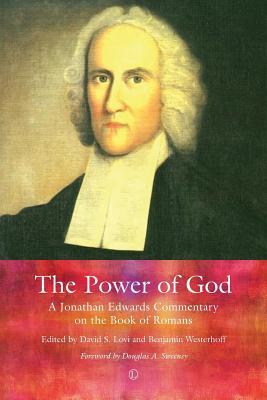- Bible
- Read the Bible
- Bible Versions
- Verse of the Day
- Reading Plans
- Verses by Topic
- Books of the Bible
- Bible Images
- Study
- Commentaries
- Concordances
- Dictionaries
- Encyclopedias
- Sermons
- Bible Atlas & Maps
- BP Wiki
- Devotionals
- Today's Devotionals
- Light of the World
- All Devotionals
- Inspirational Quotes
- More
- Picture Quotes
- Videos
- Inspirational
- Bible Study
- What The Bible Says
- Bible Q&As
- Daily Bread
- Bible by Genre
- Bible Stories
- Random Bible Verse
- Community
- Store
The Power of God: A Jonathan Edwards Commentary on the Book of Romans
by Jonathan Edwards
Paul's epistle to the Romans is one of the most beloved writings in the entire biblical canon, especially for Augustinians and Protestants. It is the subject of thousands of commentaries, many by the most important doctors of the church: Augustine, Aquinas, Luther, Calvin, Hodge, and Barth, to name a few. It offers the doctrines of sin, the gospel, and salvation in a nutshell. It is the basis for the structure of the first Protestant textbook in what later came to be categorized as systematic theology, Philip Melanchthon's Loci Communes (1521). It is a frequently-cited sourcebook of the Reformation solas, which teach that salvation comes by grace alone through faith alone because of the work of God through Christ alone. It is the site of the Romans road a standard tool for sharing the gospel used by myriad evangelists in the evangelical movement. It is a central text of scripture, in short, employed by many readers as a key to the whole Bible. Jonathan Edwards never published a major commentary on Romans. He did, however, preach about and write about Romans at numerous times throughout his life. Though he is highly regarded today as a great literary artist, natural scientist, philosopher and psychologist of religion, he was chiefly a biblical thinker, a minister of the Word. And inasmuch as he remains one of the most important thought leaders in all of Christian history, this new work, bringing together a major collection of his writings on the biblical book of Romans, will be a welcome one for many.
BUY NOW
Paperback, 388 pages
Published October 31st 2013 by Lutterworth Press (first published January 1st 2013)
© 2025 Bibleportal.com All rights reserved.

Jonathan Edwards (1703 - 1758)
was a Christian preacher and theologian. Edwards "is widely acknowledged to be America's most important and original philosophical theologian," and one of America's greatest intellectuals. Edwards's theological work is broad in scope, but he was rooted in Reformed theology, the metaphysics of theological determinism, and the Puritan heritage. Recent studies have emphasized how thoroughly Edwards grounded his life's work on conceptions of beauty, harmony, and ethical fittingness, and how central The Enlightenment was to his mindset. Edwards played a critical role in shaping the First Great Awakening, and oversaw some of the first revivals in 1733–35 at his church in Northampton, Massachusetts.Edwards delivered the sermon "Sinners in the Hands of an Angry God", a classic of early American literature, during another revival in 1741, following George Whitefield's tour of the Thirteen Colonies. Edwards is well known for his many books, The End For Which God Created the World, The Life of David Brainerd, which served to inspire thousands of missionaries throughout the 19th century, and Religious Affections, which many Reformed Evangelicals still read today.
Jonathan Edwards was a colonial American Congregational preacher, theologian, and missionary to Native Americans. Edwards "is widely acknowledged to be America's most important and original philosophical theologian."
His work is very broad in scope, but he is often associated with his defense of Reformed theology, the metaphysics of theological determinism, and the Puritan heritage. His famous sermon "Sinners in the Hands of an Angry God," is credited for starting the First Great Awakening. Edwards is widely known for his books Religious Affections and The Freedom of the Will. He died from a smallpox inoculation shortly after beginning the presidency at the College of New Jersey (later to be named Princeton University). Edwards is widely regarded as America's greatest theologian.
Jonathan Edwards was the only boy among eleven children. In 1720 he graduated from Yale as the valedictorian of his class. He continued at Yale working on a graduate degree in theology and was saved at the age of seventeen. Edwards was ordained in 1727 and joined his grandfather as an assistant pastor. In 1729 he became pastor of the church in Northampton, Massachusetts, which had some six hundred members. In 1735 God's blessing on his preaching resulted in a great revival with more than three hundred people saved and added to the church. Edwards is considered to be one of the men most responsible for the Great Awakening. His famous sermon, "Sinners in the Hands of an Angry God," was first preached in 1741 at Enfield, Massachusetts. In 1750 Edwards was voted out by his church after his attempt to limit church membership to those who made a profession of faith in Christ.
He spent the next seven years as a missionary to the Indians at Stockbridge, Massachusetts. In 1758 he accepted the presidency of the College of New Jersey (now called Princeton). After just weeks on the job, he died from smallpox brought on by an inoculation to protect him from the disease. Jonathan Edwards and his wife had eleven children. He spent one hour each night in conversation and instruction with his family. His daughter Jerusha was engaged to David Brainerd when he died of tuberculosis. Edwards' two most famous literary works are The Life and Diary of David Brainerd (1749) and Freedom of the Will (1754). Edwards is buried in Princeton, New Jersey.
... Show more